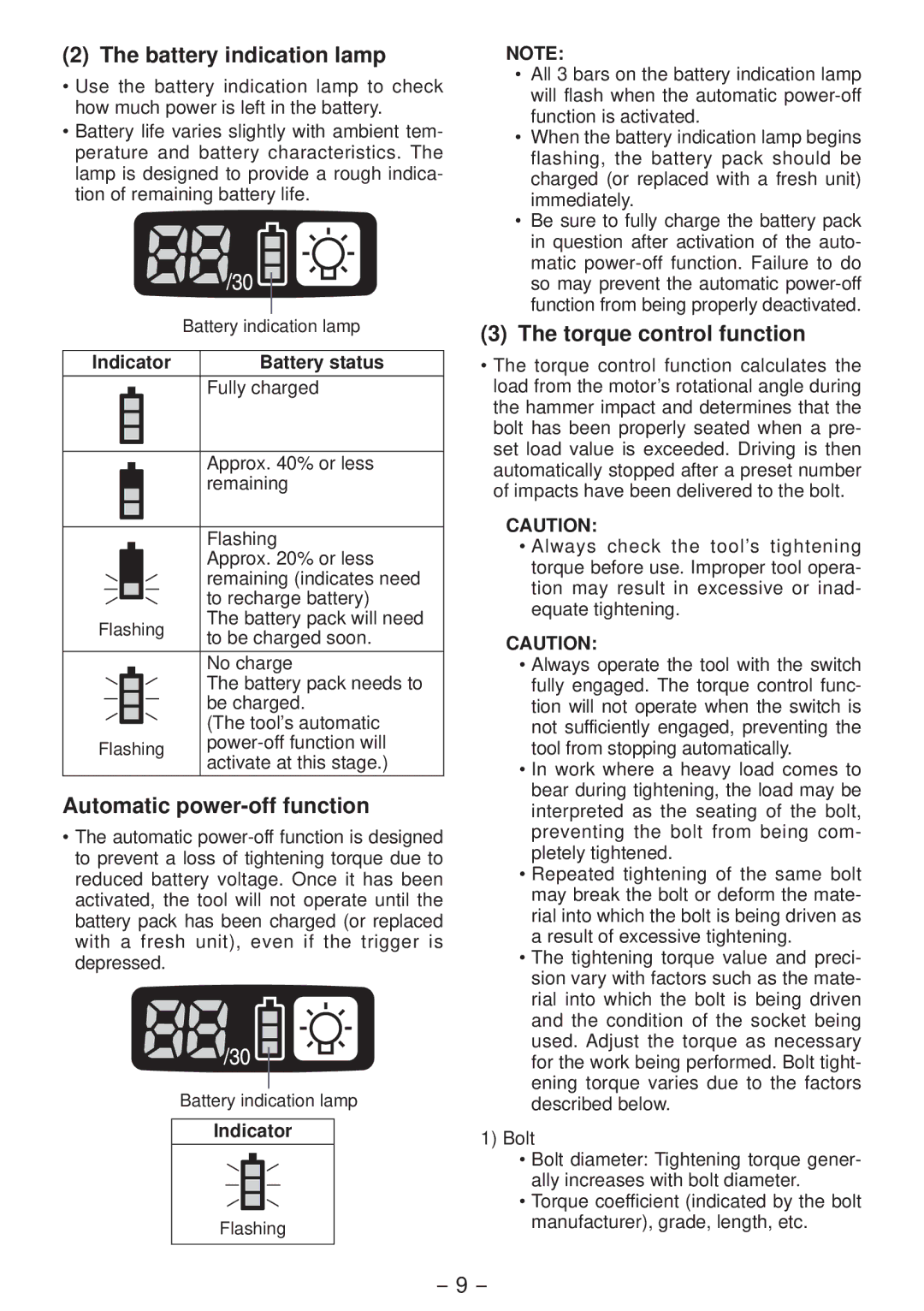
(2) The battery indication lamp
•Use the battery indication lamp to check how much power is left in the battery.
•Battery life varies slightly with ambient tem- perature and battery characteristics. The lamp is designed to provide a rough indica- tion of remaining battery life.
|
|
|
|
|
|
| Battery indication lamp | |
|
|
|
|
|
|
|
|
|
Indicator |
| Battery status | ||||||
|
|
|
|
|
|
|
| Fully charged |
|
|
|
|
|
|
|
|
|
|
|
|
|
|
|
|
|
|
|
|
|
|
|
|
|
|
|
|
|
|
|
|
|
|
|
|
|
|
|
|
|
|
|
|
|
|
|
|
|
|
|
|
|
|
|
|
|
|
|
|
|
| Approx. 40% or less |
|
|
|
|
|
|
|
| remaining |
|
|
|
|
|
|
|
| |
|
|
|
|
|
|
|
| |
|
|
|
|
|
|
|
|
|
|
|
|
|
|
|
|
|
|
|
|
|
|
|
|
|
|
|
|
|
|
|
|
|
|
| Flashing |
|
|
|
|
|
|
|
| Approx. 20% or less |
|
|
|
|
|
|
|
| |
|
|
|
|
|
|
|
| remaining (indicates need |
|
|
|
|
|
|
|
| |
|
|
|
|
|
|
|
| |
|
|
|
|
|
|
|
| to recharge battery) |
Flashing |
| The battery pack will need | ||||||
| to be charged soon. | |||||||
|
|
|
|
|
|
|
| |
|
|
|
|
|
|
|
| No charge |
|
|
|
|
|
|
|
| The battery pack needs to |
|
|
|
|
|
|
|
| |
|
|
|
|
|
|
|
| be charged. |
|
|
|
|
|
|
|
| |
|
|
|
|
|
|
|
| (The tool’s automatic |
|
|
|
|
|
|
|
| |
Flashing |
| |||||||
|
|
|
|
|
|
|
| activate at this stage.) |
Automatic power-off function
•The automatic
Battery indication lamp
Indicator
Flashing
NOTE:
•All 3 bars on the battery indication lamp will flash when the automatic
•When the battery indication lamp begins flashing, the battery pack should be charged (or replaced with a fresh unit) immediately.
•Be sure to fully charge the battery pack in question after activation of the auto- matic
(3)The torque control function
•The torque control function calculates the load from the motor’s rotational angle during the hammer impact and determines that the bolt has been properly seated when a pre- set load value is exceeded. Driving is then automatically stopped after a preset number of impacts have been delivered to the bolt.
CAUTION:
•Always check the tool’s tightening torque before use. Improper tool opera- tion may result in excessive or inad- equate tightening.
CAUTION:
•Always operate the tool with the switch fully engaged. The torque control func- tion will not operate when the switch is not sufficiently engaged, preventing the tool from stopping automatically.
•In work where a heavy load comes to bear during tightening, the load may be interpreted as the seating of the bolt, preventing the bolt from being com- pletely tightened.
•Repeated tightening of the same bolt may break the bolt or deform the mate- rial into which the bolt is being driven as a result of excessive tightening.
•The tightening torque value and preci- sion vary with factors such as the mate- rial into which the bolt is being driven and the condition of the socket being used. Adjust the torque as necessary for the work being performed. Bolt tight- ening torque varies due to the factors described below.
1)Bolt
•Bolt diameter: Tightening torque gener- ally increases with bolt diameter.
•Torque coefficient (indicated by the bolt manufacturer), grade, length, etc.
- -
